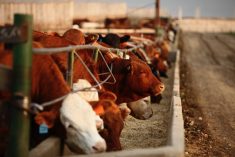Ontario’s government plans to support Canada’s comprehensive economic and trade agreement (CETA) with the European Union, but wants federal support for the province’s cheese and wine industries to follow.
“This trade deal with the (EU) will create jobs in communities across the province, and allow our businesses to sell their goods and services to the world’s largest single market,” provincial Economic Development and Trade Minister Eric Hoskins said Friday.
“Despite this support, Ontario is concerned about the potential impacts of the agreement on our pharmaceutical, dairy, wine and spirits industries,” he said. “We have raised these concerns with the federal government, and we will make specific demands of the federal government to mitigate the impacts on these key ontario economic sectors.”
Read Also

U.S. grains: CBOT soybeans, corn, wheat fall in USDA data aftermath
Chicago grains took a dive on Friday, following a closely watched U.S. government crop report and the release of export data that could provide clues into Chinese buying.
Hoskins also said Friday the province is “confident that the federal government will address these concerns in the final agreement.”
Specifically, the province said Friday it will need Ottawa to provide “adequate and real compensation” to dairy producers and cheese processors for losses, particularly in the specialty cheese market, in the wake of increased European cheese exports to Canada.
According to Dairy Farmers of Canada, Canada’s current tariff rate quota (TRQ) allows imports of 20,412 tonnes of cheese tariff-free, of which two-thirds of that TRQ is already allocated to EU cheeses.
“If this deal proceeds, the Canadian government will have given the EU an additional exclusive access of 32 per cent of the current fine cheese market in Canada, over and above the existing generous access,” DFC said Wednesday in a separate release.
The Ontario government said Friday it will require Ottawa provide “the longest possible phase-in of changes to cheese quotas, so that our dairy industry has time to prepare.”
The province said it would also need “enhanced border controls” on supply-managed products, such as dairy goods, poultry and eggs — and federal investment in “a marketing strategy to ensure that Ontario’s cheese industry has every chance to succeed and thrive.”
“Discipline”
Furthermore, the province said, its Crown liquor distributor and retailer, LCBO, will be required under the CETA to “reform the way it charges manufacturers for delivery of their product.”
With that in mind, the province said it will also need Ottawa to “support the wine and spirits sector and work with our province for industry growth.”
For its part, Spirits Canada, the Toronto-based trade association for Canadian spirits manufacturers and exporters, on Friday hailed the EU deal’s benefits for exports of Canadian product.
Association CEO Jan Westcott also said the deal “will ensure greater transparency and much-needed discipline to domestic support programs within the beverage alcohol sector, which will benefit Canadian consumers.”
The European Commission, in a separate memorandum on the CETA released Friday, noted tariff eliminations on European wine and spirits are to be “complemented by the removal of other relevant trade barriers which will significantly improve access to the Canadian market for European wines and spirits.”
The EU, the commission noted, is Canada’s “major import source of wine,” responsible already for about half of Canada’s wine imports.
Ontario noted it also needs a guarantee that provinces will be “fully compensated” for any increase in costs as a result of the EU deal’s intellectual property provisions on pharmaceuticals. — AGCanada.com Network
Related story:
Canada’s livestock farmers big winners in EU deal, dairy a loser, Oct. 18, 2013












